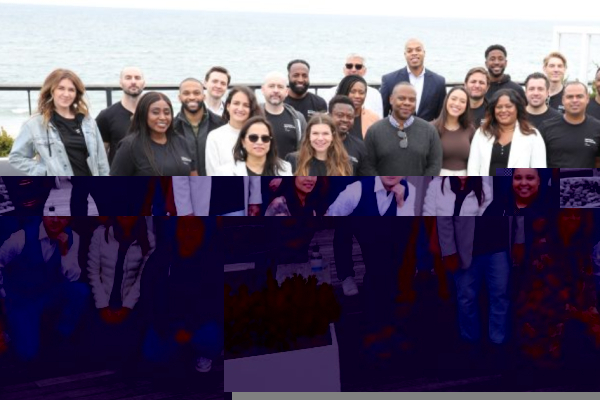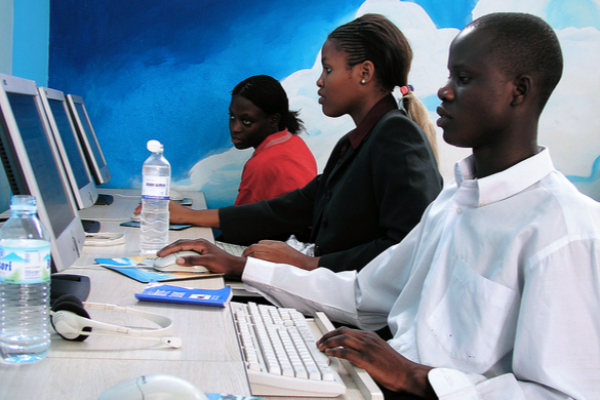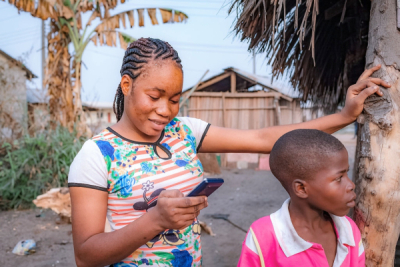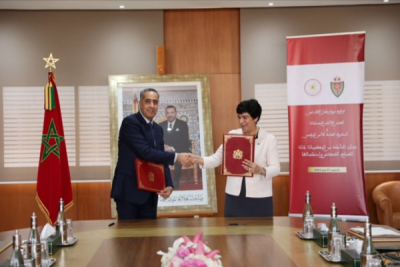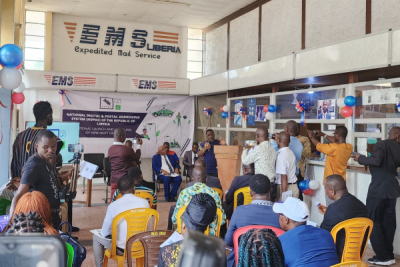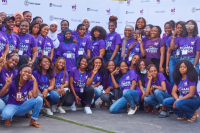Nigerian fintech company Storspay announced on Monday (May 1st), the successful completion of a $320,000 funding round. The deal allows the startup to join the New York-based accelerator Techstars for a 13-week fundraising and mentoring program. The funds raised will allow the fintech to develop its technology and improve the financial well-being of entrepreneurs through its decentralized Internet lending infrastructure.
Since 2020, the U.S.-based international organization has been providing additional capital to associations working for digital inclusion in three countries around the world. For this edition, six countries are concerned, including Ghana and Senegal.
The Internet Society Foundation, an organization that promotes the development of the Internet worldwide, announced on April 30, the opening of applications for the 2023 edition of its Strengthening Communities, Improving Lives, and Livelihoods (SCILLS) program.
The organization will award up to $250,000 in grants for projects that leverage the Internet to promote economic inclusion and boost education opportunities. In Africa, two countries are eligible, namely Ghana and Senegal.
"Internet access has increased significantly in Indonesia, however, access to Internet knowledge and skills remain out of reach for some. This new round of SCILLS program grants will support organizations that connect underserved communities with the critical digital skills needed to unlock economic growth and educational opportunities," said Sarah Armstrong, executive director of the Internet Society Foundation.
Interested parties are invited to apply with complete applications by May 31st.
Let’s note that at the of end 2022, the Internet penetration rate was 99.03%, up from 94.82% the previous year, according to a report by the Senegalese Telecommunications and Postal Regulatory Authority (ARTP).
Samira Njoya
In Africa, the lack of financial resources is not the only factor that affects access to education. The social environment can sometimes also be an obstacle. In those conditions, the well-directed use of ICT tools can address the issue.
ICT tools can be beneficial in many ways for children’s education, according to the World Bank. The international institution makes this assumption based on the experiment it facilitated, between 2018 and 2020, in the States of Kano and Jigawa, in Northwest Nigeria. The experiment involved 9393 rural households whose children aged 6 to 9 and their parents were subjected to two digital learning approaches. The approaches led to a 42% drop in the nonenrolment rate.
The baseline sample selected by the World Bank included 2,335 households in 32 communities that received only aspirational videos for parents to change their mindset and wish for better for their children. Also, 2,345 households in 32 communities received aspirational videos, and 40% of them also received a smartphone with educational content. 4,713 households in 64 communities served as a control group.
The results, documented in the “Improving Enrollment and Learning through Videos and Mobiles Experimental Evidence from Northern Nigeria” policy research paper demonstrate that aspirational videos alone reduced girls' aspirations to marry at the ages of 15 to 18. The videos had the greatest impact on the girls' parents. In households that received the aspirational videos and the smartphone, children's literacy and numeracy skills improved by 0.46 points and 0.63 points, respectively, compared to the control group.
According to the World Bank, no evidence of heterogeneous effects by gender was found overall, "highlighting the potential of edtech to also effectively reach girls in conservative settings, where girls' seclusion or a strong bias towards boys’ education may prevent girls from accessing formal schooling."
"Our heterogeneous analysis by gender shows that the interventions worked for both girls and boys and that the magnitude of treatment effects across gender were generally similar for the main outcomes (school enrollment, and literacy/numeracy skills),” the research paper informs.
Social pressure, a barrier to education
The research reveals that since smartphones are often used by multiple household members in low-resource settings, the resources provided for the experiment improved the literacy and numeracy skills of older, non-targeted siblings, reduced early parenthood among adolescents living in targeted households, and reduced early labor market entry.
For the World Bank, this is bonanza. In its 2019 Reading and Access Research Activity report, the institution revealed that northern Nigeria was significantly behind the national average in terms of education. Less than 3 percent of second graders in public elementary schools could read Hausa text with 80 percent or better comprehension. In the northwest, only 29 percent of women aged 15-49 and 59 percent of men were literate. Only 40 percent of 30-34-year-olds were educated in the northeast and northwest zones, compared to 90 percent in the southeast and southwest regions of the country.
The study believes the situation in the northwest is due to the strong adherence of the population to traditional norms. The formal legal institution of Sharia law, which applies in most northern states and covers social, civil, and criminal matters, has reinforced social norms that encourage early marriage among adolescents and thus early pregnancy. All of this represents additional barriers to education. The emergence of the militant terrorist group Boko Haram, which translates to: "Western education is forbidden," has created an additional barrier to school enrollment and attendance in the north of the country.
According to the World Values Survey 2017-2021 cited by the World Bank, 42 percent of respondents in Nigeria believe that college is more important for a boy than a girl and 41 percent believe that preschoolers suffer when mothers are employed. These norms contrast with those observed in other countries such as Kenya, where the proportions of the population holding these views are 18% and 23% respectively.
Africa has a well-documented agricultural potential. Yet, its farmers struggle in various aspects of their work. This can change with the introduction of technology in the sector.
TroTro Tractor is a digital solution developed by a Ghanaian startup. The platform allows farmers and agricultural entrepreneurs to rent agricultural equipment such as tractors, seeders, combine harvesters, and sprayers. It was developed by an eponymous startup launched, in 2016, by Adam Muhammed Muhideen and Kamal Yakub to enable easy access to modern, high-quality agricultural machinery that can help Ghanaian farmers improve productivity and maximize yields.
Through its Android app, farmers and entrepreneurs can create accounts to access the machines available. The machines can be sorted by rental rates, geographical location, and most importantly type of machine. TroTro Tractor also has a USSD code that allows farmers with no access to the internet or living in remote areas to access its services.
The startup also offers training on how to use agricultural machines, technical assistance, and maintenance services. With its maintenance reminders and management reports, it also helps farmers plan and manage their farming operations more efficiently.
According to play store’s stats, the app has been downloaded just over 100 times. This, however, is not considered a good indication of the popularity enjoyed by the solution since most African rural areas lack internet connection and the USSD code may be the most used option.
Adoni Conrad Quenum
A few years back, Morocco's General Directorate of National Security (DGSN) embarked on a series of measures to advance the country's digital transformation, collaborating with both public and private entities within the kingdom.
Recently, the Moroccan Court of Accounts (MCA) joined forces with the DGSN to encourage local financial courts to increasingly adopt the national digital identity system. To solidify their partnership, the two organizations signed a memorandum of understanding last Thursday in Rabat.
The MCA stated in a press release that the agreement "will facilitate the creation of a secure and reliable system to verify and supplement national identification data, streamlining financial jurisdiction operations and enhancing efficiency in executing and notifying procedures entrusted to them."
Launched by the DGSN in 2021, the digital identification system aims to provide citizens with highly secure digital identities, incorporating cutting-edge technologies in identity documents by 2030.
Abdellatif Hammouchi, the DGSN's director general, emphasized the need to broaden institutional partnerships that aid in identifying and authenticating digital users in order to safeguard, simplify, and digitize government services.
As per the new memorandum, financial courts will gain the capability to verify and complete data on individuals subject to the law. This is anticipated to reinforce the rule of law and its implementation while adhering to a secure system that upholds personal data protection standards.
Samira Njoya
In 2009, the Universal Postal Union encouraged its members to upgrade their addressing systems. With the current digital transformation wave sweeping across the tech landscape, many nations are seizing this opportunity to modernize their postal sectors.
Liberia recently unveiled a digital addressing system, SnooCODE, launched on April 25 in the capital city, Monrovia, by Cooper Kruah, the Minister of Posts and Telecommunications.
Developed by the UK-registered company of the same name, based in Ghana, SnooCODE operates on the mapping of the Liberian national territory. It's versatile, allowing for sending mails, tracking parcels, and even serving as a digital signature.
"Today, every corner of Liberia has a digital address, and efforts are underway to complete the operationalization of codes and to bring everyone on board. This system has been designed to address pressing health issues via technology," declared Minister Kruah.
He further revealed that the system underwent two trial phases in 2013 and 2019, as part of Liberia's initiative to foster digital technologies within the nation.
Sesinam Dagadu, the founder and CEO of SnooCODE Limited, stated that the new digital addressing system is among the most advanced globally. Users can access this system through an app available for download on the Google Play Store and App Store, with both online and offline functionality.
Once fully implemented nationwide, SnooCODE will bolster the efficiency of emergency services and security forces. It will also propel the growth of e-commerce and postal activities and streamline the duties of tax authorities.
Samira Njoya
As Africa's ecommerce sector expands, a growing number of innovations emerges and more entrepreneurs employ various tactics to secure a spot in competitive markets.
Sharwa, an Egyptian startup's e-commerce platform, enables users to buy and sell items such as clothing, beauty products, and electronics. Founded in 2022 by Alaa Shalaby, Hassan Elshourbagi, and Mohamed Hanafy, the Cairo-based startup has since raised roughly $2 million to fuel its expansion.
"Our goal is to replicate the experience of visiting a hypermarket with family, where everyone adds items to the same cart, benefiting from the low prices that become available. Our clients appreciate our service as a weapon against inflation," remarked Sharwa CEO, Alaa Shalaby.
Downloaded over 100,000 times, the Sharwa app, available on Android, allows users to set up accounts, upload item photos, and provide descriptions to entice potential buyers. Buyers can then browse the offerings and place orders for items they desire.
Upon receiving orders, sellers are alerted and begin preparing the products for shipping. Utilizing the startup's last-mile delivery services, purchased items are directly sent to homes or offices.
The platform incorporates online payment methods, such as bank transfers and payment gateways, to ensure secure transactions within its virtual marketplace. Additionally, users can group orders to take advantage of the best deals by simply clicking the "buy with friends" button. Once completed, these orders will be delivered the next day.
Sharwa also offers a Whatsapp ordering option, where users can chat with a designated number to place and manage orders.
Adoni Conrad Quenum
Last Saturday, the Commodity Futures Trading Commission (CFTC) announced an order requiring Cornelius Johannes Steynberg, CEO of South African company Mirror Trading, to pay $3.4 billion over bitcoin fraud. Specifically, Steynberg will have to restitute in excess of $1.7 billion to defrauded victims and pay over $1.7 billion in civil penalties.
Non-profit organization Tech4Dev recently announced the launch of its Women Techsters initiative, aimed at providing scholarships for a virtual learning program to girls and women in Africa.
The program will equip participants with skills in blockchain, cybersecurity, data science, and artificial intelligence engineering, mixed reality/3D animation, mobile app development, product design (UI/UX), product management, and software development.
African women between the ages of 16 and 40 interested in the program are invited to apply by May 27.
The solution is the result of one of its founder’s experience. The latter was assaulted when he was a student. After his painful experience, he decided to give others the means to quickly inform relevant authorities when they encounter such situations.
Usalama is a digital solution developed by a Kenyan startup. It allows users to alert relevant authorities when they are threatened, assaulted or burgled. The idea for the solution started from an unfortunate experience one of the founders had while still a student.
“One evening while going home I was suddenly surrounded by four men at gunpoint. I sadly realized that there was no way I could call for help. One of them punched me in the gut and as I was writhing in pain they ransacked me. The ordeal lasted for five minutes but afterwards I saw a problem,” explains Edwin Inganji, one of the founders of Usalama.
The solution has an Android app, through which users can register and select people to be contacted in case of emergency. The app uses GPS to pinpoint users’ exact location, which is transmitted to relevant people along with the time of danger facing the user. Four danger scenarios are predefined on the app and the user, in case of danger, can select one of them.
“Our focus as of now is on four types of emergencies: medical emergencies, security emergencies, roadside rescue and gender-based violence. In each of these areas we seek emergency service providers that offer services in the respective sector and sign them up for our platform,” Edwin indicates.
Usalama sends a message with the location of the victim, the location of the rescuers, the three police stations closest to the victim, and the respective paths to the victim. When the contacts to be reached also have the application on their smartphone, they receive distress calls or notification prompting them to open the app and check the emergency.
The app has already been downloaded more than 5,000 times. Its founders plan to launch it in other countries as more countries are faced with insecurity on the continent.
In 2017, Usalama was a winner of the Innovating Justice BoostCamp of The Hague Institute for Innovation in Law (HiiL). It was awarded €20,000 in funding. In 2019, it was also selected for the Westerwelle Young Founders¸ program, which offers access to six months of mentoring and access to the program’s network.
Adoni Conrad Quenum
More...
Last week, the Beninese IT development agency ASIN organized a workshop to review and update the national cybersecurity strategy.
This mid-term review gave digital actors the opportunity to lay the foundations for the coming update, which aims to respond to the new challenges arising from the evolution of digital uses and related threats, three years after the strategy was launched.
The Cameroonian Union of hospitality employers SPIHT launched, Tuesday (April 25), a digital platform for the promotion of the local hotel and tourism industry.
The platform, called Waka Waka 237, allows visitors to find and book hotel rooms, apartments, restaurants, tourist sites, and travel agencies throughout Cameroon.
The Pan African Payment and Settlement System (PAPSS) and the African Securities Exchange Association (ASEA), on Friday April, 14, signed a memorandum of understanding to improve cross-border payment systems and promote the development of financial markets in Africa.
According to the release announcing the memorandum, the partnership will, among other things, create a reliable and efficient payment system that will allow investors to easily carry out transactions on various transactions on the continent.
To achieve digital inclusion and digitally transform the continent, Smart Africa Alliance needs to collaborate with several actors. Hence the recent partnerships.
On the sidelines of the 6th edition of the Transform Africa summit (April 26-28) in Zimbabwe, the Smart Africa Alliance signed partnership agreements to promote digital transformation in all key sectors.
Notably, it signed agreements with the Internet Society, Hitachi Systems Security, Estonian ICT, Zhejiang University, and the Innovation for Policy Foundation (i4Policy).
With the Internet Society, Smart Africa signed a memorandum of understanding to collaborate on a range of issues, including community network development, measuring Internet resilience and reliability, and capacity building.
The agreement with Canadian company Hitachi Systems Security aims to assist and support African cyberspace among other things.
As for the agreement with the Estonian association Estonian ICT, it provides for the design, development, deployment, and operation of public digital infrastructure on the continent.
The collaboration with Zhejiang University will contribute to knowledge generation and dissemination through the Smart Africa Digital Academy (SADA).
With the Innovation for Policy Foundation, Smart Africa envisions collaboration on various topics consistent with their respective vision and mission. i4Policy advocates and lobbies for the adoption of innovation-friendly policies in various sectors, including digital.
It is worth noting that the partnership agreements add to the one signed on Tuesday, April 25 with the African Development Fund (ADF) for the launch of the IDECT project aimed at boosting e-commerce in Africa


